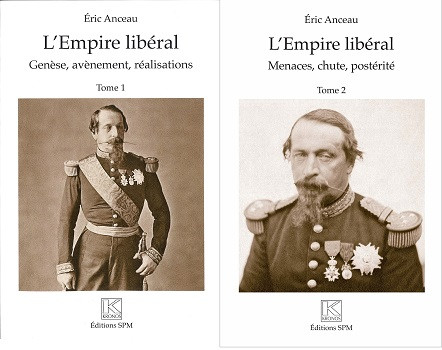(in French)
The two volumes of Éric Anceau’s “Empire libéral” (Volume 1: Genesis, Advent, realisations; Volume 2: Threats, the fall, posterity), consist of 1425 pages of an extremely dense and meticulous analysis of the last phase of the Second Empire, a period of political turmoil, reformation and modernisation – in other words, the liberalisation of the regime. This experience, which has been eclipsed by the failure of the Franco-Prussian war, is finally put into perspective with this major work. (Marie de Bruchard)
This book was published with the support of the Fondation Napoléon, the Université Paris-Sorbonne, the Centre de Recherches en Histoire du XIXe s., the École Doctorale 2 (modern and contemporary history).
Editors’ presentation:
The brief moment in history to which this 2-volume book is devoted is here called the “Liberal Empire”, the last avatar of the Second Empire. Created in January 1870, this regime fell fewer than nine months later and was therefore a scathing failure. But was it inevitable?
If this regime has been very widely presented as an experience doomed to failure and therefore without much interest, it was because it was first evoked by those who overthrew it or indeed, on the contrary, by the die-hard Bonapartists who found in it an ideal scapegoat, then later by historians who already knew how the story would end.
History is not a judgement and is not limited to the study of the victors. The purpose of his book is to relate and analyse one of the most extraordinary moments of political upheaval, resituating it in the two centuries that surround it.
In the 1860s, the project of an imperial liberal democratisation was forged, based around the triptych “order, freedom and reforms”, to reconcile the French and to put an end to the era of Revolutions. If it failed, certain ideas were immediately condemned, others soon imposed themselves. It was exemplary and symbolic of both national grandeur and misery. It constituted a modest contribution to the quest for what Marcel Proust called “the key to France” a key that gives access to the mysteries and behaviours of the French people.


